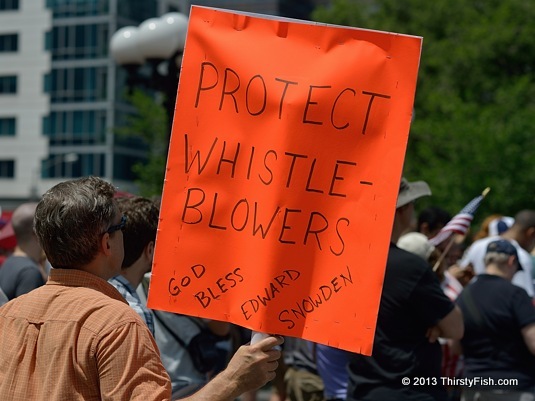Protect Whistleblowers; God Bless Edward Snowden

Snitch. Informant. Squealer. Rat. Deep throat. Before Ralph Nader coined the term whistleblower in the 1970's, exposing misconduct, dishonest or illegal activity occurring in an organization had a negative connotation. In the U.S., whistleblowing and whistleblower protection is affected by a vast mishmash of contradictory laws. On one hand, the federal government and states encourage whistleblowing when they are on the receiving end of wrongdoing, and even put up rewards when it comes to things like Medicare or Medicaid fraud. On the other hand, they generally discourage any public disclosure of internal wrongdoing, which they tell us, they prefer to correct privately. Whether they handle wrongdoing satisfactorily or not is another story.
What are the options for a whistleblower, when wrongdoing in their own institution is not handled internally? How about when wrongdoing involves issues of national security at the highest levels? Not many. Both, in the public and private sectors, most employees are bound by non-disclosure agreements which are very difficult to legally circumvent. Any public disclosure of issues that the government may perceive to have an impact on national security, as we have found out in recent cases, is heavily punished; Chelsea Manning was imprisoned with a 35 year sentence, and other whistleblowers such as Jesslyn Raddick, William Binney, Thomas Drake and Julian Assange were harassed.
Everyone knows who Edward Snowden is by now. If you don't, you owe it to yourself to watch his interview and learn about the NSA Files. Thanks to him, layer by layer, we are learning about the extent of ongoing monitoring in what we now know to be "the" surveillance state.
In 1999, the head of Sun Microsystems, Scott McNealy said: "You have zero privacy anyway. Get over it". It turns out, he was right about the first part - we have zero privacy. Ten years later, in 2009, Google CEO, Eric Schmidt proclaimed: "If you have something that you don't want anyone to know, maybe you shouldn't be doing it in the first place". Edward Snowden's revelations turned these arguments upside-down! If the government has zero privacy, shouldn't she get over it? If the government has something that she doesn't want us to know, maybe she shouldn't be doing it in the first place! The nothing to hide argument is a weak one, for so many reasons. It's hard to believe "educated idiots" like McNealy and Schmidt could not figure this one out. Can you?
Posted
- Wed 2013-12-11
Captured
- 2013-07-04
- New York, NY


